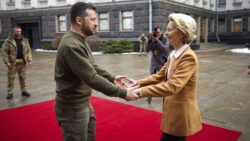After months of worrying about the negative effects of the United States Inflation Reduction Act, the European Commission unveiled new plans to boost green industries in Europe.
The “Green Deal Industrial Plan”, as it was dubbed, is a combination of measures to strengthen the EU’s attractiveness for investment and manufacturing.
Brussels wants to out-subsidise and out-incentivise the US and China – because in the next few years, it will be crunch time for the shift towards a more sustainable future, according to European Commission President, Ursula von der Leyen.
“We are living now in a decisive time, basically the decade that will decide whether we are going to be successful in fighting climate change or not.
“We want to seize this moment. We know that in the next years, the shape of the economy, the net zero economy, and where it is located will be decided.”
Needless to say, the plan comes with a hefty price tag.
And the “who-pays-what-how-and-when” has already triggered angry discussions among member states – discussions that will come to a head at next week’s EU summit.
EU-Ukraine summit
There seemed to be more EU unity on Ukraine this week — not about weapons, but about Kyiv’s prospects for EU membership.
Before the European Commission arrived in the Ukrainian capital for another summit meeting, the Ukrainian Prime Minister let it be known that his government wants to join the bloc in two years.
“An ambitious goal,” as he himself admitted. The immediate reaction in EU capitals was less lukewarm.
There are many reasons: Ukraine is a country at war whose economy and governance are simply not ready for prime time. And there is the eternal problem of corruption.
Just recently, the government discovered a wide-ranging scandal and top officials were under no illusions of the potentially mortal danger corruption represents for Ukrainian democracy.
“The state, hiding behind the war, cannot ignore that the country is being eaten away by corruption of a certain kind. That would demoralise society. Society would not trust its state. In times of war, society cannot be allowed to doubt the state,” Mykhailo Podolyak, adviser to President Volodymyr Zelenskyy said.
Von der Leyen said in Kyiv on Friday that a report on EU enlargement will be presented in the autumn.
She also announced that a tenth package of sanctions against Russia is expected to be in place by the one-year anniversary of the start of the war.
Two more MEPs have immunity removed
Back in Brussels, corruption was also a main topic on Thursday, as Andrea Cozzolino and Marc Tarabella, two MEPs caught up in the scandal rocking the European Parliament, had their parliamentary immunities lifted.
The vote in the plenary session followed a request by the Belgian Federal Public Prosecutor’s Office on 16 January and came two days after the European Parliament’s legal affairs committee backed the motion.
Both MEPs deny any involvement in the illicit lobbying allegedly conducted by Qatar and Morocco.
Italian MEP Cozzolino was not present for the vote but Tarabella, from Belgium, voted to have his immunity waived.
“I have been asking for the lifting of this immunity since the very first days of this affair in order to be able to answer the questions of the investigators and to help the justice system to shed light on this case,” he told reporters after the vote.
“Out of respect for the judicial authorities and for the work of the investigation, I refrained from commenting on the accusations in the press. It was very tempting to respond to them, especially as I am innocent, but I have not yet expressed myself and I will not do so again today in order to reserve the first part of my explanations to the judge. In any case, you should know that I have nothing to reproach myself for,” he added.





